Genre: Platformer Developer: AOOG Publisher: U.S. Gold Players: 1 Released: 1992
Izzy’s Quest for the Olympic Rings was released in 1995 for the Genesis and Super NES, a whole year before the Atlanta Olympic games it tried to evoke. As a new avatar in a crowded genre, Izzy didn’t garner much attention ten years ago and got lost in the sea of 16-bit platform games released in late 1994 and early 1995. It’s not too hard to understand why, because this is an essentially unassuming and not terribly spectacular cart; but it gradually grew on me and should please most fans of underrated 2D platform games.
This game’s concept is…odd, to say the least. The player controls Izzy, usually described as a “cute, little blue animal-like thing,” if that makes some sense; he is on a quest to find the five rings that were stolen from the Atlanta Olympic games. To get them all, Izzy must go through many places in the Torch World; the rings can also be found in several bonus stages between levels.
While the premises are strange, the game’s mechanics are firmly set in the platform genre of the hop and bop variety. There are many things to collect throughout the levels. Aside from extra lives and continues, Izzy can collect gold, silver and bronze medals; they add to his point totals, but they’re also linked to his health (if you have all three medals, you can take two hits instead of one). The developers added a fairly original technique to the game, as Izzy can morph into several athletes and try his hand at baseball, fencing, archery, etc. for limited periods of time if he gets to Morphing stars. Finally, there are two kinds of bonus stages between the levels: in one, Izzy has to ascend platforms on his way to the goal; in the other, the cart becomes a sort of vertical driving/shooting game, as you must negotiate a ‘space race’ with obstacles and enemies, but there are also key items to collect.
The graphics are quite elementary, but still decent. While the characters are not extremely detailed, the backgrounds are pleasant enough to look at, and the settings are both varied and unusual (a Greek village, a lava-laden place, deep space…); the game has a fairly unique look, dominated as it is with blue, purple, green and brown tones. The main knock on the graphics is the considerable amount of slowdown that takes place pretty much whenever Izzy jumps, and it gets worse in the later, busier levels. I personally got used to it quickly, so it doesn’t pose that big of a problem after a few tries. The upbeat music and sounds effects are passable, but don’t add a lot of flavour to the game; Izzy’s digitized (and Genesized…) quips are fun, though, and just as weird as his appearance.
The play control is solid, and precise once the player has adjusted to the frequent slowdown; even though 1) the non-platform segments can be a bit difficult to get the hang on, and 2) the hit detection can be a bit off sometimes. The hop and bop action is spiced up not only by the morphs and occasional flying sections in the levels, but also by the two kinds of jumps at Izzy’s disposal. The spin-jump (button B unless you change the configuration beforehand) destroys the enemies he jumps on, whereas the “hurdle jump” (C) is not as effective against enemies but has a longer, higher reach. The gameplay is equally enlivened by the challenges posed to Izzy at some points in the game, such as long jumps and spectacular dives. All these aspects contribute to the game’s overall feel and succeed in fusing together sports-based elements and the platform genre.
The game is not terribly original, but I really appreciate it nonetheless. One of the main pleasures in platform games is the… “stuff collecting,” and this cart truly delivers in that regard, with many items sewn in the various worlds Izzy must get through. One more proof of the game’s surrealism: Easter Eggs (literally) with goodies appear out of nowhere when Izzy touches specific spots in the stages. The levels are very well designed, too, with many hidden areas and alternate passageways for more adventurous gamers. The bonus stages are fun to play through as well, and if you eventually get tired of them, they are easy to skip. The degree of challenge is just about right: few players should get through the entire game untouched, and the Difficult mode makes for some intense platform-based action. The game is long enough to offer a satisfying experience, but short enough to warrant multiple (and fast) playthroughs.
The gameplay does have a few drawbacks. The morps are not fully integrated in the overall scheme, and their assorted segments end far too soon. Also, there should have been more statistics given out between levels – say, the percentage of objects found, detailed medal totals, or a sort of grade or result in the mold of the Olympic games. Retro gamers with a taste for odd, cult platform games should strongly consider giving Izzy’s Quest for the Olympic Rings a chance. It pales in comparison to better-made 1995 platform games like Ristar and VectorMan, but the quest it packs is still worth taking.
SCORE: 6 out of 10

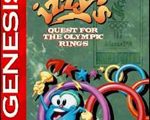
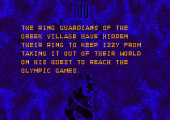
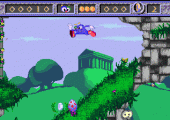
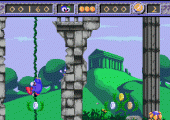
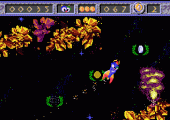
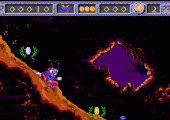
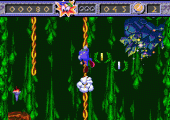
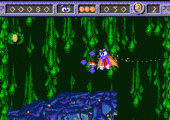
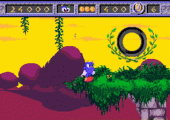
Recent Comments